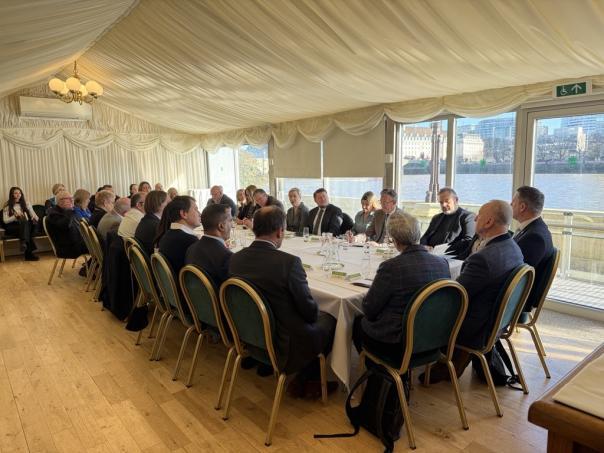
With experts from across the industry representing catering in schools, universities, hospitals, care homes, prisons and catering colleges, we enjoyed some hearty conversations on the challenges and opportunities that lie ahead.
Funding across the public sector
With food inflation and other costs rising at double digit rates in recent years, many organisations are struggling to meet the requirements for good, tasty nutrition. However, public sector catering is an essential service that often provides a safety net for vulnerable citizens. This puts operators in a challenging position where some additional costs are simply unavoidable and have to be absorbed so that food can still be delivered in a compliant way and within budget.
Several speakers highlighted that disparities are found in funding across sectors, jurisdictions, from region to region or between different health trusts. While this adds to the challenges of taking the industry forward, events such as this one offer a great opportunity to share experiences and best practices ideas.
Using more data and technology
Iain Robertson, chair of the Hospital Caterers Association, called for the industry to go back to the floor for a roots-up review of current practices to see how technology can assist with better management of food waste and unserved meals.
This issue of food waste was echoed by Denise Bean, head of catering at HM Prison Service, but Charles Abraham from Sodexo noted that the introduction of mandatory food waste reporting will assist in reaching a target 15% reduction by summer 2025.
While this type of outcome demonstrates the huge benefit of adopting more data-led practices, a word of caution was shared around increased regulatory reporting requirements. “What gets measured gets managed”, said Karen Beech from the Crown Commercial Service, “however, too much measurement can also lead to nothing being managed.”
On this, there is certainly a need to strike the right balance of leveraging data to better inform decisions, which will pay back with greater process efficiencies and monetary savings, as long as it doesn’t create new barriers from over-documentation.
It also has to be delivered in a way that makes compliance as easy as possible, otherwise keeping up will just become a drain on resource that is desperately needed elsewhere. Technology solutions are available from Civica that can do exactly this.
The future health of the nation
Longer term, is the public sector better off focusing its argument for support on the social and economic value of meals provided? In other words, can we frame the conversation around making the investment in a healthier, more productive population? This topic generated some useful insights into what the wider objectives of public sector catering should be, and also how to get there.
Focusing all the attention on the cost of a meal is not the right approach, said Nadim Ednan-Laperouse from the Natasha Allergy Research Foundation. “We need to change the lens to show how public sector catering is impacting the ability for the UK to grow.”
This idea was echoed by Professor Kevin Morgan, a public sector catering academic. He said: “The common objectives of health, wellness and growth can help to change the government’s perspective on the value of food.”
In terms of working towards this change, creating an all-parliamentary group on public sector catering in England would provide more focus on issues that affect the whole sector and potentially help fast-track the transformation that is needed.
It’s an approach that has already brought progress in Scotland where the Good Food Nation Act was introduced in 2022, while in Wales a cross-party group also drives the national approach to public sector catering. Is this something that the industry in England can galvanise?
Changing the way that we talk about food
The conversation also moved to how public sector catering can address the shift we are seeing in meat versus plant-based options, incorporating ideas around welfare, sustainability, health benefits and cost. This was discussed in the context of how healthy food options are positioned.
Across the group, for example, there was a feeling that the ‘eat less meat’ message detracted from the real objective of achieving better health and sustainability.
The uptake of more sustainable menus, it was said, is directly affected by the messaging and presentation of food. For example, the phrase meat free Mondays gives the impression of something being taken away – that it is only ‘one or the other’ – and this will likely have a negative influence on outcomes.
Overall, it was agreed, the intention should be to promote ‘nutritionally balanced meals’ and transform the discussion into a more positive one rather than creating divisive dialogue that misses the point.
Working towards transformation in public sector catering
To round off, speakers acknowledged the importance of broader policy engagement to better link up with the full supply chain and help to inform Government policies. In doing so, the sector can move as one in bringing the types of transformations that are needed to navigate through this challenging climate.
Innovative approaches to cost management, better harnessing of data insights to drive efficiencies and maintain compliance, aligning industry messaging around the relationship between health and better economic outcomes, as well as messaging around the different ways to achieve nutritionally balanced meals – these are all key areas for the industry to consider moving forward.